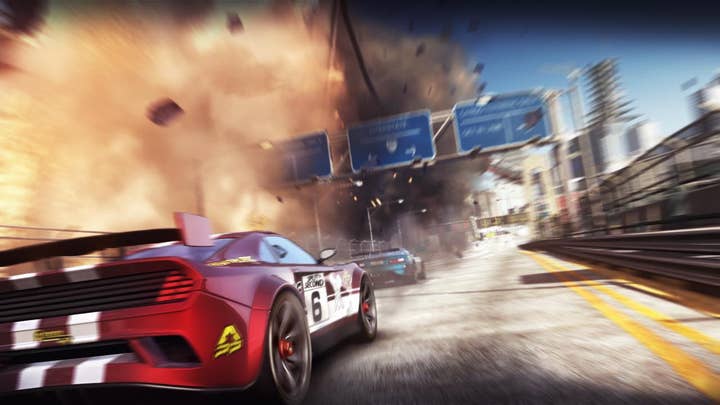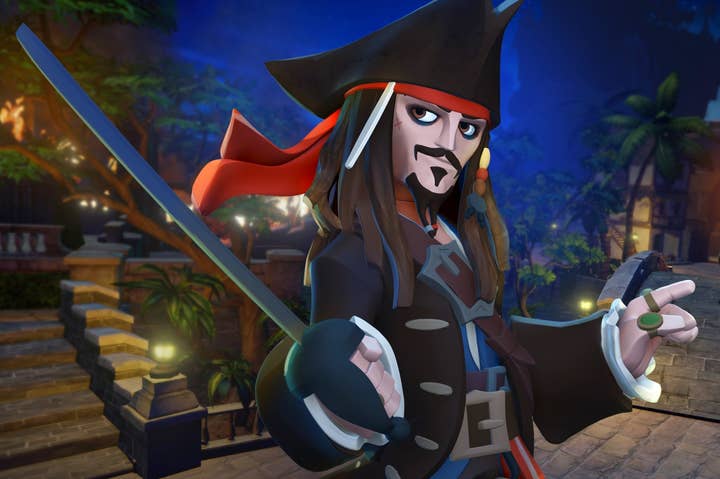To Infinity and Beyond
Why Studio Gobo is all about games, toys and the console market
"We really lucked out with Disney Infinity," says Gobo's Tony Beckwith. "It's exactly in the area we were interested in. It's sold spectacularly. They said the other day, three million starter packs. So that's not bad."
"Not bad" is something of an understatement. Last week, Disney CEO Bob Iger highlighted Infinity as the core driver behind a huge upswing in Disney Interactive's operating profits - a shift from $9 million to $55 million, year on year.
In fact, so successful was Infinity that Iger has said that it'll be pretty much the only thing which Disney Interactive publishes for the near future, with nearly all other games a matter of licensing IP to external agencies.
So how did Gobo, 92 per cent of the staff of which comes from defunct Disney racing studio Black Rock, get given the keys to develop a child-friendly platform adventure in the shape of the Pirates of the Caribbean playset for Disney Infinity? Beckwith says that they've always been ready to try new things, even if they started out on more familiar ground.
"We tried at Black Rock to break out of the Racing genre, we kind of got typecast," he explains. "We were worried, doing F1 first, that it would happen again, the idea that we only made racing games and couldn't do anything else. We haven't got any plans to go back to racing, but never say never! I'd love to have a go at Mario some day. But we're happy where we are - we've earned our spurs in kids platforming now.
"It was great getting to work with Pirates of the Caribbean - especially for guys who come from racing games. To trust us to work in a completely different genre with such a high prestige IP. I think Disney's Avalanche Software saw us being successful - and the reviews bore that out."
Experience has proven that trust was well-placed, but the mission statement from an early Gobo brochure shows that there's been a clear intention to move into the toy and game crossover market from the very beginning.
"Our mission at Gobo is to be a pioneer in the exciting new spaces created by media convergence," it reads. "We have an experimental and playful approach to challenging preconceptions of what a game, book, TV show or toy should be."
Remarkably prescient, especially given that this was written in the days before Activision's Skylanders had indicated just how big the market could be.
"It was all about media convergence," says Beckwith. "At the time we were really interested in TV, toys and video games. We were talking to Microsoft Soho and various other people who were in that convergence area - they were working on Sesame Kinect. We were talking to various TV stations too - Channel 4, various production companies. They knew nothing about games, but that's why they wanted to talk to us. But toys and games has really worked out - so we're going to stick with that.
"When we first started doing Pirates, Disney said to us that they thought this was going to be a pretty big market. Later on, someone told me that Skylanders alone was worth around fifty per cent of the entire mobile market."
Given the short but impressive track record the studio has in the sector, that seems sensible - but given the vocal concerns of many for the future of home consoles, does Beckwith feel that it might be wise to put a few mobile feathers in his cap?
"It seems like 90 per cent of the UK games industry has jettisoned console development and gone towards mobile," he tells me with a wry smile. "There's only so much talent that mobile can take and I do wonder if it's reaching over saturation point - every man and his wife is working on mobile.
"So I think it's really good that we're still waving the flag for console, that we're successful in that. I remember going to a conference a couple of years ago where one of the Playfish guys did a talk. He had a slide of a Tyrannosaurus Rex and he said, this is you, console developers. You're going out of business. That's Playfish, which EA shut down. But at the time that hurt, being called a dinosaur.

"I believe the toys-to-life category that Gobo is working in is currently Blue Ocean," he continues, referring to Satoru Iwata's shark-related metaphor about why it's sometimes best not to follow the shoal. "I think mobile today is looking very, very much like Red Ocean with a number of companies now selling out at the top just before the bubble pops. Facebook gaming was a very red ocean a couple of years ago and look how that bubble has deflated since, with Playfish gone and Zynga trying to reinvent itself."
I ask Beckwith what the plan is for the future.
"We don't want to grow too big," he says, emphatically. "Black Rock was 140 people. We never want to do that again. We're about 25 now and we're ramping up a bit - I think we'll go to about 40 people here. We don't want to change the studio culture, either - we still want to carry on with our Gobo Friday Lunches and close knit "family" culture, but we're definitely investing.
"It's a talent business. The office isn't valuable because of the computers, or the kettle, it's the people. I hope that people feel that they're looked after here, because talent is our number one priority. I recently had my first employee tell me they never want to leave and I thought, yeah, mission accomplished.
"We need to grow but we're extremely fussy, we have very high hurdles to jump to get into Gobo, as any of the guys here will tell you"
"We need to grow but we're extremely fussy, we have very high hurdles to jump to get into Gobo, as any of the guys here will tell you. I always worry when people say they haven't had that problem. If you've grown fifty heads and you've found that easy, you're probably sucking up shit! The quality threshold here is very, very high."
Many of the reviews of Infinity agreed, singling out Gobo's work on Pirates of the Caribbean as the standout content in the package. With Disney's Iger confirming to investors that there's definitely more ahead for the franchise, surely we can expect some of that work to be landing at Gobo's door?
"All we can say is that we're working for Disney again," Beckwith tells me with a big grin. "We like setting harder and harder challenges for ourselves, so our next one is tougher."

